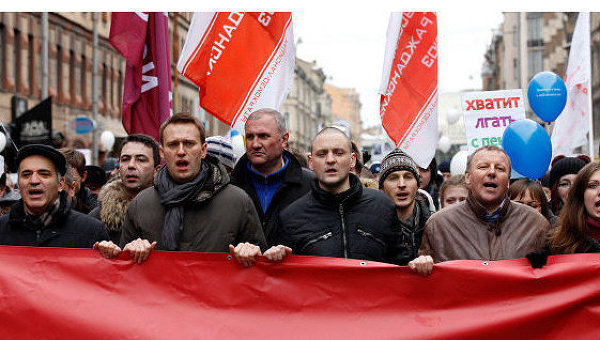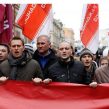
Putin Leads a War-Like Campaign Toward a Crushing but Hollow Victory
Publication: Eurasia Daily Monitor Volume: 9 Issue: 40
By:

The last two weeks before the Russian presidential elections on March 4 saw a pronounced turn toward more aggressive and populist-patriotic campaigning by Vladimir Putin, who appears to be on track to a decisive victory. His team of seasoned courtiers was shocked by the explosion of street protests in Moscow after the blatantly falsified parliamentary elections last December, but they have responded by mobilizing administrative resources for staging a series of mass rallies in support of the “Who-but-Him” candidate. The culmination of this counter-offensive came in Luzhniki on February 23 at a pompous gathering, which was intended to demonstrate that nothing could prevent Putin from manufacturing a big win in the first round. What struck many observers and commentators was the emotional charge of Putin’s speech. He directly questioned the pseudo-enthusiastic audience members about whether they loved Russia and appealed to them to give their lives for the victory as their ancestors had done in the battle of Borodino (Kommersant, Novaya Gazeta, BestToday.ru, February 24). The nearly-hysteric drive was certainly very different from the pose of supreme confidence that Putin normally strikes in the carefully orchestrated meetings with the “common people” (Moscow Echo, February 24).
What makes this militant rhetoric even more odd is Putin’s strong emphasis on security matters during the last week, starting with the article in Rossiiskaya Gazeta (February 20) and continuing with the meeting with defense experts in the Sarov center of nuclear research (Kommersant, February 25). There is not much new content in the pledges to restore Russia’s military might and ensure the implementation of the massive rearmament program. In addition, the long-overdue shift to an all-professional army is still postponed into the indefinite future, so the dedovshina-infected conscription system is set to continue (Gazeta.ru, Polit.ru, February 21). Most of the problems generated by the ongoing military reform are downplayed in Putin’s discourse, but the issue that really captures his attention is the US missile defense program (Kommersant, February 25). The experts tried to suggest politely that the issue is much overblown and that the European “echelon” of missile defense constituted no threat to Russia’s deterrent capabilities, but Putin refused to be ambivalent on the matter. He asserted that ten regiments, equipped with new strategic missiles, would constituted the asymmetric response to the US plans and that the new S-500 surface-to-air systems would form the backbone of Russia’s own missile defense system.
These strategic ambitions interplay in a peculiar way with the deep-seated suspicions that Washington is planning regime change in Russia and the sudden explosion of street protests is a part of this plan (Novaya Gazeta, February 21). Putin informed the experts that the United States lost control over the situation in the Middle East and North Africa because it miscalculated the consequences of decision on changing regimes in Egypt and other countries. Russia’s firm position on Syria and Iran, on the other hand, was based on assessment of national interests. This fits nicely with his claim to the “fans” in Luzhniki that no interference in Russia’s internal affairs would be tolerated as well as with his advice to the opposition to stop betraying the Motherland (Moscow Echo, February 24). Appealing to the old misperceptions that Russia is surrounded by enemies, Putin makes his campaign into a war against the revolution half-believing himself that it is financed and directed by the treacherous West.
The opposition is both stirred up and taken aback by this aggressive campaign and feels that the street protests are losing momentum. Most people who went to Bolotnaya Square were offended by the fraudulent and narrow victory of the ‘party of crooks and thieves,’ as the pro-Putin United Russia is widely known, but now have to accept that the majority of voters will probably indeed vote for Putin (Levada.ru, February 24). The emotional motivation of the crowds that celebrated their freedom from fear has not been translated into a coherent political program, and now experienced politicians like Boris Nemtsov or Grigory Yavlinsky have to put together an action-plan that appeals to the somewhat disappointed protesters but will not aim at staging a revolution, which remains a disturbing idea for the disgruntled urban middle classes (Moskovsky Komsomolets, February 24). One part of the plan is to focus the work more on mobilizing the opposition in St. Petersburg, which voted strongly against United Russia and has disavowed Putin and his clan of Pitertsy (Gazeta.ru, February 22). The weekend rallies in St. Petersburg gathered some 20,000 participants of different persuasions who gave a loud cheer to Aleksei Navalny, perhaps the most charismatic leader in the ‘white’ camp (Fontanka.ru, Rosbalt, February 25).
Seeking to consolidate the laborious mobilization of the ‘masses,’ the Kremlin sends unmistakable signals that no further street politics would be tolerated after the decisive proof of legitimacy for the ruling regime (Kommersant, February 25). This might discourage a good many joyful but risk-averse protesters, but remains, nevertheless, a dangerous bluff since the capacity for repression is in fact quite limited. The officer corps is deeply angered by the poorly conceptualized but stubbornly executed military reform and is far more likely to rise against Defense Minister Anatoly Serdyukov than to follow his order to move tanks against the mutinous crowds in Moscow or St. Petersburg (New Times, February 20). The true beneficiaries of Putin’s regime – unlike the crowd of “have-nots” in Luzhniki – have too much to lose, and the order of the FSB Director Aleksandr Bortnikov, instructing his subordinates to get rid of the property registered abroad, is hardly going to be obeyed scrupulously (Kommersant, February 24).
Abandoning his platform of stability and adopting a confrontational stance, Putin builds for himself a fake support base because the cheaply recruited “fans” are in fact more responsive to the leftist discourse of Gennady Zyuganov or populist message of Vladimir Zhirinovsky. His victory is set to produce a weak president isolated from the dynamic society and relying on a deeply corrupt and dubiously loyal bureaucracy (Vedomosti, 22 February). Detesting weakness, Putin is driven by the need to prove himself as a strong leader, and that departure from political reality may cut his next presidency very short.




